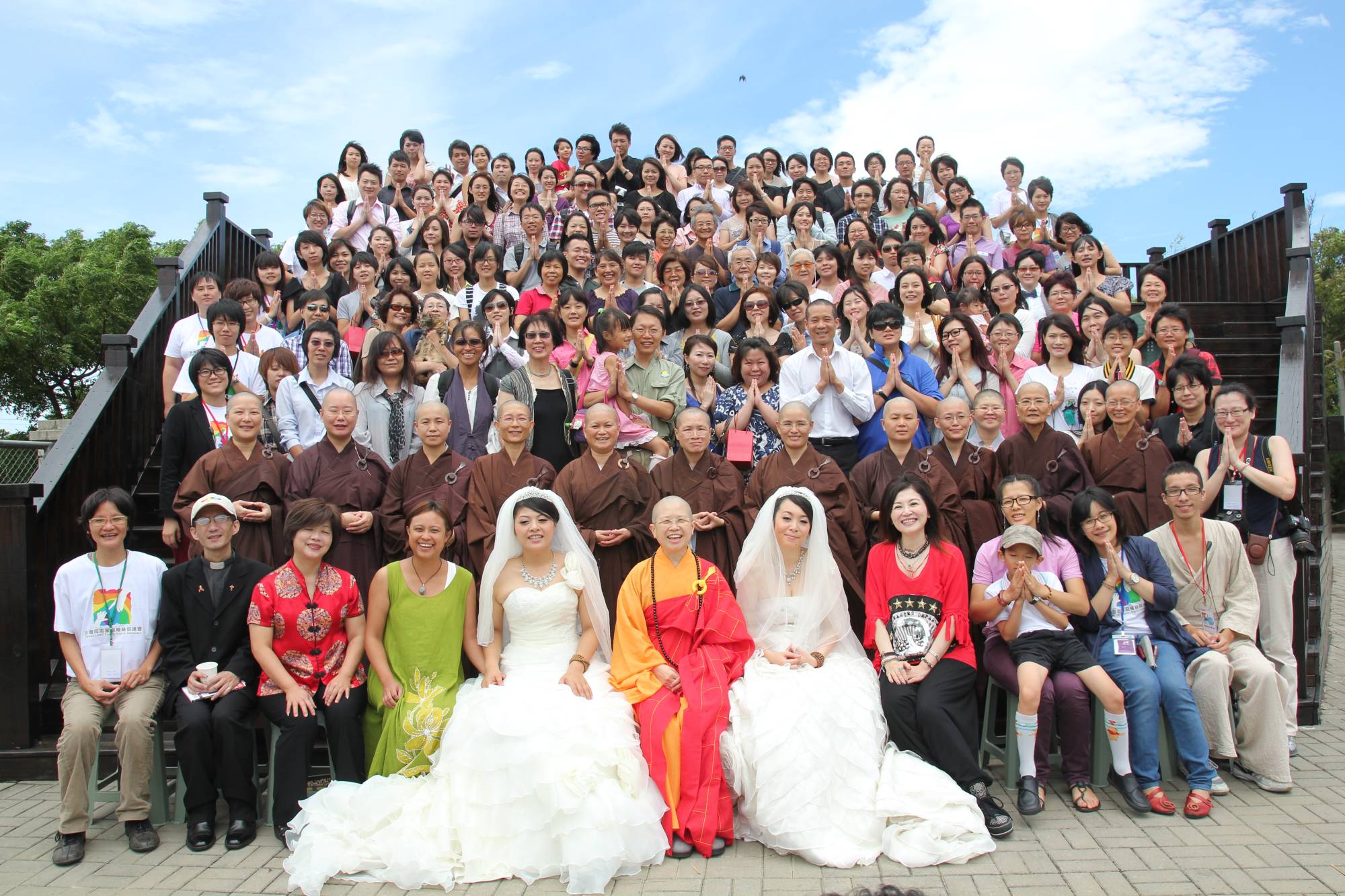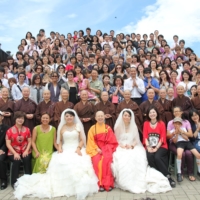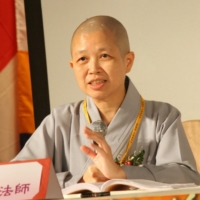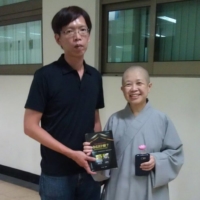This year, the 38th Niwano Peace Prize will be awarded to the Venerable Shih Chao-hwei of Taiwan in recognition of her work in peace building through her safeguarding of all forms of life, promotion of gender ethics and gender equality, and her approach to open-minded dialogue with different religious leaders and social groups.
As a leading social advocate in Taiwan, Shih has successfully campaigned on a wide range of issues, including gender equality, animal rights and nuclear power, among others. She currently teaches religious studies at Hsuan Chuang University as a professor and is the founder of Buddhist Hong-shi College.
“I am humbled to be among the other pioneering figures who have bravely and diligently committed themselves toward the well-being and harmony of our planet. And I vow to steward and carry forth this legacy with all my devotion and effort,” Shih wrote in her acceptance letter.
To avoid undue emphasis on any particular religion or region, every year the Niwano Peace Foundation solicits nominations from people of recognized intellectual and religious stature around the world. In the nomination process, some 600 people and organizations, representing 125 countries and many religions, are asked to propose candidates. Nominations are rigorously screened by the Niwano Peace Prize Committee, which currently consists of seven religious leaders from various parts of the world, all of whom are involved in movements for peace and inter-religious cooperation.
“During the last two decades, Venerable Shih Chao-hwei has led social movements to safeguard life in all forms. She promotes gender ethics, gender equality and open-minded dialogue with different religious leaders, social groups and academia,” wrote committee member Nokuzola Mndende. “She also gives leadership and fearless engagement towards promoting peace. As a Buddhist, she stands up to promote sustainable peace.”
The presentation ceremony will take place in Tokyo on June 2. In addition to an award certificate, Shih will receive a medal and ¥20 million.
Life of dedication
Shih was born in Yangon, Myanmar, in 1957, and moved to Taiwan in 1965. She was ordained in 1980. In 2004, she founded Hsuan Chuang’s Research Centre for Applied Ethics. She is also the founder of the Life Conservationist Association, which lobbies for animal rights legislation. She received the 48th Chinese Literature and Arts Medal for her outstanding contributions to cultural debates, as well as the International Outstanding Women in Buddhism Medal in 2009, and The Person of the Year Prize for social movements in 2012. Together with the Dalai Lama, she has been appointed as the spiritual mentor and patron of the International Network of Engaged Buddhists, founded by the renowned Thai Buddhist reformer, Sulak Sivaraksa. Shih is the author of over 31 books and more than 77 research papers, including numerous manuscripts on nature conservation.
Her work on animal rights includes facilitating the legislation of the Wildlife Conservation Act and the Animal Protection Act, promoting the Buddhist practice to care for all sentient beings. She also ran a campaign to ban gambling on horses in Taiwan, which was successfully passed by parliament. This campaign is in line with her work on gambling, heading a coalition against the practice in Taiwan. She has campaigned against the building of casinos in economically disadvantaged Taiwanese regions, and her anti-gambling movement successfully led a referendum to stop casino construction on Penghu Island in 2009.
Her work on gender equality includes speaking out against cultural and structural violence. In 2001 she called for the abolition of the controversial “Eight Garudhammas” (where additional precepts are required of fully ordained Buddhist nuns above and beyond the monastic rules that applied to monks), declaring that these precepts were not codified by Buddha himself, and that they strongly discriminate against women. This position raised international attention toward the Buddhist gender equality movement. In 2007, she convened an international conference titled Religious Culture and Gender Ethics to widespread acclaim from international academics, religious circles and feminist activists.
Shih has written many articles on environmental conservation and ecological protection, human rights and issues concerning religion and politics. She is bold in expressing her opinions from the Buddhist point of view, and publishes articles in several major newspapers in Taiwan.
Fighting despite risks
The committee noted Shih’s courage in the face of difficulties and her preparedness to give voice to controversial topics. In its press release, the committee wrote that “while she may feel fear, she also faces up to fear, calling it ‘the foremost enemy in one’s life.’ She recognizes that true peace of mind does not come from remaining silent or ignoring an issue, but rather by confronting it. We acknowledge her perspective that often there must be a breakdown of superficial harmony and serenity in order to reach deeper levels of truth and peace of mind.”
“The world after COVID-19 is an altered one. Globally, we’ve shared a powerful common experience but there are also worrying trends that point to new fractures and deepening divisions. Therefore, we must contemplate how these ongoing transformations can be steered toward societal healing and peace building,” Shih wrote in her acceptance letter. “Of course, speaking out does not come without risk but true peace comes only when we can see past the illusions of superficial harmony and serenity. When we see injustice and do not act, then we experience a kind of torment, too. Taking action allows a more profound serenity and peace to emerge in our heart and in our world. The coronavirus pandemic has exposed long-held illusions and shattered old patterns. What we are presented with is an unprecedented opportunity for building better for all sentient beings.”
Annual award recognizes endeavors that aim to ease suffering through interreligious cooperation
The Niwano Peace Foundation established the Niwano Peace Prize to honor and encourage individuals and organizations that have contributed significantly to interreligious cooperation, thereby furthering the cause of world peace, and to make their achievements as widely known as possible.
The foundation hopes in this way to enhance interreligious understanding and cooperation and encourage the emergence of still more people devoted to working for world peace.
The prize is named in honor of the founder and first president of the lay Buddhist organization Rissho Kosei-kai, Nikkyo Niwano. For Niwano, peace was not merely an absence of conflict among nations, but a dynamic harmony in the inner lives of people, as well as in our communities, nations and the world.
Niwano Peace Prize recipients
2020 Pomnyun
2019 John Paul Lederach
2018 Adyan Foundation
2017 Munib A. Younan
2016 Centre for Peace Building and Reconciliation
2015 Esther Abimiku Ibanga
2014 Dena Merriam
2013 Gunnar Stalsett
2012 Rosalina Tuyuc Velasquez
2011 Sulak Sivaraksa
2010 Ela Ramesh Bhatt
2009 Gideon Baguma Byamugisha
2008 Prince El Hassan bin Talal
2007 Cheng Yen
2006 Rabbis for Human Rights
2005 Hans Kung
2004 The Acholi Religious Leaders’ Peace Initiative
2003 Priscilla Elworthy
2002 Samuel Ruiz Garcia
2001 Elias Chacour
2000 Kang Won-yong
1999 The Community of Sant’Egidio
1998 Maha Ghosananda
1997 The Corrymeela Community
1996 Marii K. Hasegawa
1995 M. Aram
1994 Paulo Evaristo Arns
1993 Neve Shalom/Wahat al-Salam
1992 A.T. Ariyaratne
1991 Hildegard Goss-Mayr
1990 Norman Cousins
1989 Etai Yamada
1987 The World Muslim Congress
1986 Philip A. Potter
1985 Zhao Puchu
1984 Homer A. Jack
1983 Helder P. Camara






